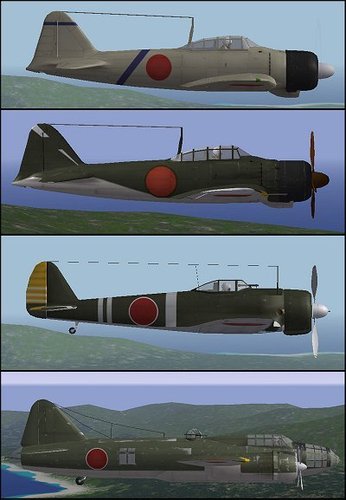Japanese Aircraft Pack Addon by Armourdave
- Version
- 3,939 downloads
***********************************
Japanese Aircraft Pack for
Strike Fighters : Project 1 by Armourdave
***********************************
build 27-11-2004
***********************************
Installation
***********************************
Unzip the japanese_aircraft.zip to your \objects\aircraft folder
Move the nations.ini to your \flight folder.
***********************************
Pack introduction & History
***********************************
*******
A6M
*******
The Mitsubishi A6M Zero-Sen legendary status mirrored the fortunes of the rising sun, in which four years, the sun would finally set. For the Japanese and its former enemies, the A6M was the symbol of Japanese air power. The A6M fighter marked the beginning of a new epoch in naval aviation and was the first shipboard fighter capable of surpassing land-based aircraft.1 With its tight turning radius, it was an extremely deadly weapon in a dogfight, and was famous for its ability to outmaneuver, Brewster F2A Buffaloes, Curtiss P-40s and Grumman F4F Wildcats. As early as 1937, Claire Chennault, the author of 'The Role of Defensive Pursuit,' warned the USAAF about the dangers of Japanese air power. Apparently his warnings were ignored, as the superiority of the A6M was a complete surprise to the American forces.2 As leader of the Flying Tigers, Chennault constantly stressed to his pilots, 'Never try to turn with a Zero. Always get above the enemy and try to hit him with the first pass.'3 Because of the A6Ms exceptional range and performance, it was to bear the brunt of the action, of almost every military engagement in the Pacific, until the end of the war. 4
*******
Ki-43
*******
The Hayabusa was a sleek little dogfighter, relatively slow and lightly armed (just two fuselage-mounted machine guns at a time when other fighters were carrying multiple machine guns or even cannon in their wings). At first, these weaknesses seemed not to matter, but as time went on, the Hayabusa was totally outclassed by its opponents in every respect except tight-turning dogfighting. And even that advantage counted little against enemy aircraft that refused to meet the Hayabusa on its own terms. Unfortunately for Japan, the Hayabusa had to continue on as a front-line fighter to the end, because its successor-the Ki-84 Hayate (which see)-was never available in sufficient quantities, and was not as reliable as the older fighter.
Interestingly, design work on the Ki-43 began even before its predecessor, the Ki-27 Nate, entered service with the JAAF. In December 1937, the Army told the Nakajima company to design a new fighter to supercede the Ki-27. The new plane would be faster in level flight (300+ mph), swifter-climbing (5 minutes to 16,405 ft.), longer-ranged (a radius of action of 500 statute miles), with the same armament and maneuverability as the earlier fighter. The Nakajima team, led by Hideo Itokawa, worked steadily for a year, and the new plane was first flown early in January 1939.
*******
G4M2
*******
Designed to an incredibly demanding 1938 Navy specification, the G4M family (given the code-name "Betty" by the Allies) was the Imperial Japanese Navy's premier heavy bomber in World War II; yet the insistence on the great range of 2,000 nautical miles (3,706 km) with full bomb load made the saving of weight take priority over defence and the aircraft was highly vulnerable and not very popular. The wing was of the same Mitsubishi 118 section as the Zero-Sen and boldly designed as an integral fuel tank to accommodate no less than 5,000 litres (1,100 gal). The company kept recommending four engines and being overruled by the Navy, which, during the early flight-test stage, wasted more than a year, and 30 aircraft, in trying to make the design into the G6M bomber escort with a crew of ten and 19 guns.
Eventually the G4M1 was readied for service as a bomber and flew its first missions in South East China in May 1941. More than 250 operated in the Philippines and Malayan campaigns, but after the Solomons battle in August 1942 it began to be apparent that, once intercepted and hit, the unprotected bomber went up like a torch (hence the Allied nickname "one-shot lighter"). Total production reached the exceptional quantity of 2,479, most of them in the many sub-types of G4M2 with increased fuel capacity and power. Finally the trend of development was reversed with the G4M3 series with full protection and only 968 gal fuel.
***********************************
Known Issues
***********************************
* Hires textures might cause you problems if your graphics card is from the previous century
* Ki-43 has no fast prop.
* G4M2 is AI only so dont even bother
***********************************
Aircraft Files
***********************************
All aircraft models, cockpit models and cockpit textures authored by David (AD).
All flight models authored by Wolf257
This pack contains 4 aircraft and 6 skins.
Aircraft Skin
A6M2 - White (Volksjaeger)
White (Lansen)
A6M5 - Camo (Volksjaeger)
Green (Volksjaeger)
Ki-43 - Green (Volksjaeger)
G4M2 - Green (Volksjaeger)
All Hangar screens and A6M2/5 loading screens by Kevin "Wrench" Stein
***********************************
Thanks to
***********************************
Jason "Volksjaeger" Brash
Jim "Wolf257" Farmer
Kevin "Wrench" Stein
Lansen
Whoever hosts this pack
-
-
-
(from 2 reviews)
- 0 comments


